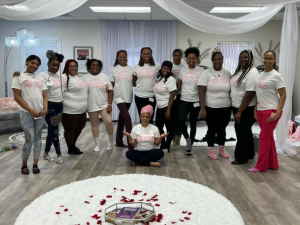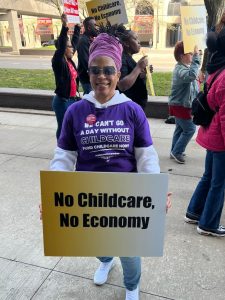
Zina Davis, known as Mama Zina to her families, is blazing a trail for Detroit’s children.
Owner and founder of Children of the Rising Sun (CRS), a child care center for infants to 5-year-olds, Davis has decades of early childhood experience as an educator and mother. Early care and education is part of her family’s legacy: she found her passion for the job working in her grandmother’s child care business, and opened her home to children for 13 years. Her curriculum is grounded in culture and spirituality, prioritizing the needs of each individual child as a holistic approach. Having grown into a three-classroom center that can serve up to 56 children, Davis’ own daughters and mother support the center as staff, creating an environment that families can trust. Davis calls their program “the village.”
“How do we make that environment trusting? We make it feel like home,” said Davis.
Davis’ home-based program was the first in the Detroit area to receive a 5-star quality rating from Great Start to Quality (GSQ), now known as Demonstrating Quality in GSQ’s reimagined quality improvement process. She maintained that status for four years. Davis’ home-based program was rooted in African-Centered learning, a form of pedagogy that grounds children in their cultural heritage and focuses on their specific needs. She began the GSQ process in 2013, wanting to better understand the traditional definition of quality, and see how her alternative curriculum met that standard.
Now a growing center, Children of the Rising Sun is inspired by Waldorf and Reggio Emilia curriculums, which honor the child and provide an education specific to the urban and low-income families of Detroit. She strives to curate a center where children feel comfortable and nurtured, prioritizing muted colors and a soothing environment that allows children to focus. This child-centered approach, which Davis describes as “accommodating where they are, their skills, and what their genius is,” has made CRS approachable to families with special needs and neurodivergent children.
“Our children are geniuses, and they need the same opportunities that suburban children have,” said Davis. “Why can’t our babies have that? It’s just as important.”
Davis says it’s critical to not just care for the child, but to understand them—including their environment. When working together with families to address children with challenging behaviors, she noticed that the roots often came from families’ home lives. Other programs weren’t always able to reach these families and provide the support they needed. Davis found that providing a safe space for families, often grounded in shared experiences as African American mothers, made the difference.
Watching her parents struggle, Davis worked with University of Michigan’s Center of Health and Research Transformation (CHRT) and funded by The Max & Majorie Fisher Foundation to create an innovative solution: maternal mental health and emotional wellbeing support, combined with free child care and referral to additional resources. This 9-month support program for mothers launched as a pilot in 2022, where each “Mom Circle” session provided two hours of talk therapy, self-care resources, food, and—key to the program’s success—free child care for children up to age 12 while mothers were in the session. This whole-family support helped moms who frequently cited a lack of child care as barriers to self-care and therapy. Davis and CHRT began a second Mom Circles within Early Childhood Education cohort in September 2024, with plans to expand these support groups to fathers and grandparents. At the end of the 9-month program, mothers are given resources and referrals for continued support, as well as 1-on-1 sessions with specialists.
“We always look in early childhood to support the children, but we forget about the caregivers’ social and emotional support,” said Zina Davis. “These women have created community and a sisterhood through this. A safe space to talk, learn, and heal. The children represent my gift, the moms’ group represents my passion.”
In addition to the work she does with individual families, Davis leverages her decades of experience as a child care professional, business owner, mother, and community leader as a policy advocate. When Davis recognized the need for equity in programs being addressed by political and government entities, she spoke out about the lack of action on a key issue: wages.
Affordability is a key issue for families, but child care professionals also face inadequate pay. Business owners can’t raise their prices to support higher wages, because families already struggle to afford care.

Children of the Rising Sun received funding from the Great Start to Quality Infant Toddler Quality Improvement Pilot, which was designed to help programs improve quality and retain staff. The pilot found that 55% of all grant funds were spent solely on staff wages. An additional 30% of these funds were spent on bonuses and benefits for staff. Davis recently hosted ECIC staff, partners, and former Michigan Speaker of the House Representative Joe Tate for a legislative visit to discuss how the ITQI pilot supported her program and advocate for the needs of child care business owners in Michigan.
“I’m in a position where our voices are being heard,” said Davis. “I’m grateful to be able to be a trailblazer for early childhood programs.”
